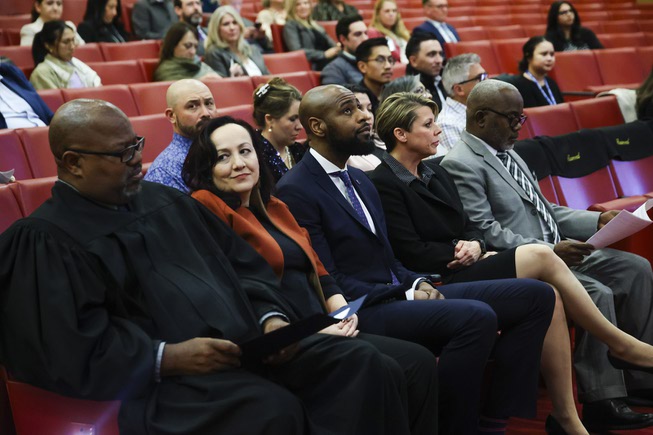
From left, US District Court Judge Richard Boulware and new Clark County School District board members Romana Esparza-Stoffregan, Adam Johnson, Lisa Satory and Dane Watson wait to be sworn in at Las Vegas City Hall, downtown, Tuesday, Jan. 2, 2024.
Saturday, Jan. 13, 2024 | 2 a.m.
The Clark County School District Board is seeking to expand restrictions on its nonvoting, appointed board members with a policy that does not allow the newly seated members to make or second motions during meetings.
The policy proposal has drawn sharp criticism, prior to a vote on it at Thursday night’s School Board meeting and in letters from state lawmakers and from the mayors of Las Vegas, Henderson and North Las Vegas and the Clark County manager, whose municipalities selected the appointees.
Motions and seconds are predicates to voting. Last year’s Assembly Bill 175 — a bipartisan effort to add four advisory members to the seven elected members of CCSD’s often-fractured school board — explicitly said the appointed members would not vote.
The law also does not allow the appointees to serve as Board officers.
But it does not say anything about making or seconding motions; it says that aside from not voting or serving as officers, appointees “shall have the same rights and responsibilities as voting members of the board of trustees.”
The legislation’s cosponsors, Assemblywoman Shannon Bilbray-Axelrod, D-Las Vegas, chair of the Assembly Education Committee, and Assemblyman Toby Yurek, R-Henderson, said in a letter to the board that not allowing motions or seconds by the appointed members was counter to the legislative intent.
“I hope we don’t have to go in and make a legislative change next session, but if that’s what we have to do, we will,” they wrote.
Not allowing motions would curtail the ability of nonvoting members to place items on agendas, they wrote.
Under existing policy, if a board member requests an item be included on an agenda and that request is declined, the appeal process requires the requesting trustee to make a motion during a meeting that their item be included on a future agenda.
If an appointee’s request to place an item on the agenda is denied on the first attempt, there is no recourse.
“Nothing in AB 175 gives the board the ability to strip appointed trustees of their right to offer motions, so the rule changes being proposed on this agenda can only been seen as a cavalier effort to skirt the very same law that created the appointed trustee positions and a cynical attempt to preserve power in the hands of only those trustees who were elected,” Bilbray-Axelrod and Yurek wrote.
The board has fought the hybrid concept from the beginning, saying the move stifles democracy and accountability.
Leo Benavides, the government affairs manager for North Las Vegas, told board members at Thursday’s meeting that the proposed policy “only seeks to further chip away what appointed trustees and, at large, the cities can bring to the discussions.”
North Las Vegas clashed with CCSD last fall when the City Council selected Councilman Isaac Barron to be its School Board delegate. The district opposed the appointment because Barron is also a CCSD teacher. District regulation bars current employees from sitting on the School Board, a longstanding rule that predates the addition of appointees.
Barron stepped aside before he could be sworn into the post. The city then selected a staffer from the Clark County Education Association teachers union in his place, at least until Barron, who is in his mid-50s, retires.
“From the beginning, the city of North Las Vegas has been disheartened with how passage of the bill and the appointed trustees have been treated by the board and by the district,” Benavides said. “In fact, this is the second time that the School District has concluded that internal policy supersedes state law despite clear legislative intent.”
Nicole Rourke, Henderson’s director of government and public affairs, told board members the appointees “should be seen as welcome advisers, not voices to be silenced.”
“Each municipality took great care in selecting their appointed trustee. These four outstanding individuals have extensive school-based and administrative experience in education,” she said. “They have served this community as teachers and principals and have far more experience in the field of education than the elected officials sitting on the dais.”
Bryan Wachter, director of public and government affairs for the Retail Association of Nevada, challenged the School Board to give a full explanation of “the intent behind this — why this doesn’t serve student success to be able to have these trustees have their say and recognized legislative rights.”
In their joint letter, the city and county leaders said the bill was clear about what is and is not permitted.
“This means the bill does not permit the board to prohibit the newly appointed members from making motions,” they said. “If the Legislature intended for the new trustees to be barred from making motions, they would have included that language.”
School Board President Evelyn Garcia Morales said they incorrectly implied that appointees will have no rights.
“This board has discussed this item in public and this item is coming to us the way that our governance policies require,” she said. “We are fully committed to fully engaging our new members to make meaningful change toward improved student outcomes.”
Board members approved the measure 5-1, with Linda Cavazos voting no and Brenda Zamora absent. To go into effect, the policy must be passed on second reading with that vote scheduled for the School Board’s Jan. 25 meeting.
